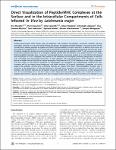Direct Visualization of Peptide/MHC Complexes at the Surface and in the Intracellular Compartments of Cells Infected In Vivo by Leishmania major
Muraille, Eric
Gounon, Pierre
Cazareth, Julie
Hoebeke, Johan
Lippuner, Christoph
Davalos-Misslitz, Ana
Aebischer, Toni
Muller, Sylviane
Glaichenhaus, Nicolas
Mougneau, Evelyne
Protozoa and bacteria infect various types of phagocytic cells including macrophages, monocytes, dendritic cells and eosinophils. However, it is not clear which of these cells process and present microbial antigens in vivo and in which cellular compartments parasite peptides are loaded onto Major Histocompatibility Complex molecules. To address these issues, we have infected susceptible BALB/c (H-2d) mice with a recombinant Leishmania major parasite expressing a fluorescent tracer. To directly visualize the antigen presenting cells that present parasite-derived peptides to CD4+ T cells, we have generated a monoclonal antibody that reacts to an antigenic peptide derived from the parasite LACK antigen bound to I-Ad Major Histocompatibility Complex class II molecule. Immunogold electron microscopic analysis of in vivo infected cells showed that intracellular I-Ad/LACK complexes were present in the membrane of amastigote-containing phagosomes in dendritic cells, eosinophils and macrophages/monocytes. In both dendritic cells and macrophages, these complexes were also present in smaller vesicles that did not contain amastigote. The presence of I-Ad/LACK complexes at the surface of dendritic cells, but neither on the plasma membrane of macrophages nor eosinophils was independently confirmed by flow cytometry and by incubating sorted phagocytes with highly sensitive LACK-specific hybridomas. Altogether, our results suggest that peptides derived from Leishmania proteins are loaded onto Major Histocompatibility Complex class II molecules in the phagosomes of infected phagocytes. Although these complexes are transported to the cell surface in dendritic cells, therefore allowing the stimulation of parasite-specific CD4+ T cells, this does not occur in other phagocytic cells. To our knowledge, this is the first study in which Major Histocompatibility Complex class II molecules bound to peptides derived from a parasite protein have been visualized within and at the surface of cells that were infected in vivo.
No license information
Related Items
Show related Items with similar Title, Author, Creator or Subject.
-
2013-04-15ZeitschriftenartikelGiardia duodenalis arginine deiminase modulates the phenotype and cytokine secretion of human dendritic cells by depletion of arginine and formation of ammonia Banik, Stefanie; Viveros, Pablo Renner; Seeber, Frank; Klotz, Christian; Ignatius, Ralf; Aebischer, ToniDepletion of arginine is a recognized strategy that pathogens use to evade immune effector mechanisms. Depletion depends on microbial enzymes such as arginases, which are considered virulence factors. The effect is mostly ...
-
2010-05-17ZeitschriftenartikelSuperior antigen cross-presentation and XCR1 expression define human CD11c+CD141+ cells as homologues of mouse CD8+ dendritic cells Bachem, Annabell; Güttler, Steffen; Hartung, Evelyn; Ebstein, Frédéric; Schaefer, Michael; Tannert, Astrid; Salama, Abdulgabar; Movassaghi, Kamran; Opitz, Corinna; Mages, Hans Werner; Henn, Volker; Kloetzel, Peter-Michael; Gurka, Stephanie; Kroczek, RichardIn recent years, human dendritic cells (DCs) could be subdivided into CD304+ plasmacytoid DCs (pDCs) and conventional DCs (cDCs), the latter encompassing the CD1c+, CD16+, and CD141+ DC subsets. To date, the low frequency ...
-
2010-07-08ZeitschriftenartikelLegionella pneumophila induces human beta Defensin-3 in pulmonary cells Scharf, Stefanie; Vardarova, Kremena; Lang, Friederike; Schmeck, Bernd; Opitz, Bastian; Flieger, Antje; Heuner, Klaus; Hippenstiel, Stefan; Suttorp, Norbert; N'Guessan, Philippe DBackground: Legionella pneumophila is an important causative agent of severe pneumonia in humans. Human alveolar epithelium and macrophages are effective barriers for inhaled microorganisms and actively participate in the ...

